Research and innovation

UTC-Compiegne: committed to research and innovation
A specific vision of research and innovation that promotes positive impacts
The environmental and societal challenges we face today are complex and call for a transdisciplinary, systemic approach, sometimes even a shift in paradigm, in order to be tackled effectively.
Since its establishment, UTC-Compiegne has developed a research programme oriented towards technology and the culture of innovation, the specificities of which combine to provide innovative and impactful solutions to the climate emergency and societal changes.
Research at UTC focuses on the development of concrete and applicable solutions to meet the challenges of ecological transition.
We encourage transdisciplinary and systemic approaches to research. UTC research scientists are able to approach environmental problems from different angles, integrating scientific, technological, social and economic perspectives. The contribution of the expertise of UTC’s Costech laboratory, specialising in the study of interactions between Society, technology and the environment, complementary to the research projects of other laboratories, is a real strength of UTC. Thus we do not limit ourselves to the design of clean technologies and fully integrate the analysis of the social and cultural issues linked to their adoption and acceptance, through to the design of effective public policies to promote environmental sustainability.
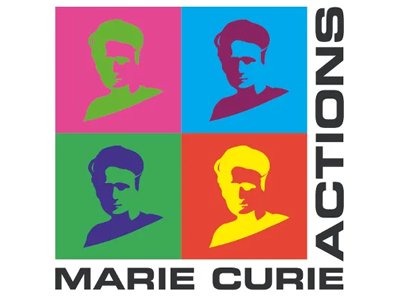
New economic policies for transition
Economic POlicies for the Global bifurcation (EPOG) – a doctoral network
David Flacher, an economist at UTC-Costech, has set up a doctoral network project as part of the "Science of Excellence" category of the EU-Horizon Europe programme. The aim is to fund theses to devise the economic policies needed for the ecological transition.
Our scientific approaches are participative and cooperative, rooted in our local areas while also having an impact on a national and international scale. By working closely with external partners such as businesses, local authorities and associations, our research scientists ensure that their solutions for the ecological transition meet the real needs of Society today. This approach speeds up the transfer of knowledge and technologies to the market-place. Furthermore, our international collaborations enable us to benefit from a diversity of expert inputs and global “best practice”, enriching our research perspectives, stimulating innovation and promoting the adoption of sustainable solutions on a global scale.

IDEES project – Integration of Environmental, Economic and Social Dimensions in a Logic of a Circular Economy
Within the framework of the so-called AGEC law (Anti-Gaspillage and Circular Economy), the IDEES project, led by UTC's Process Engineering (UTC-GP) and Technology, Society, Humanities (UTC-TSH) departments, aims to develop a decision-making tool for the choice of organic matter management scenarios on a territory, intended for local authorities, based on a systemic approach and taking into account the environmental, economic and social impacts in a circular economy logic.
Our dual status, as a University and a French engineering school (“grande école”) means that we are able to strongly integrate training and research. By involving students in research projects, we help to develop their analytical and critical skills, as well as their ability to explore innovative solutions and push back the boundaries of knowledge in their respective fields. In so doing, we are training the next generation to design and implement new and sustainable solutions.

Why are engineers committed today to ecological transition?
A research project on the ecological commitment of engineers is being developed with the support of the UTC's Research Directorate and in partnership with Antoine Bouzin, a PhD student at Bordeaux University. For Hadrien Coutant, senior lecturer in sociology at UTC-Compiegne, the aim is to understand why engineers are over-represented in environmental movements.
Thanks to its original features, UTC's research has a great deal to offer in terms of meeting the challenges of an ecological transition and, in essence, shows a strong commitment to resolving societal issues. We work in all areas of research to develop those projects that are designed to have a positive impact. UTC is proud to be able to contribute to this shift in paradigm by taking a holistic approach to the challenges and catalysing change towards a more sustainable future. This original positioning is that of a university of technology. It is a new way for UTC, as its motto says, “to lend meaning to innovation".
A commitment in all areas of research and innovation at UTC
UTC is widely recognised for its scientific excellence and its innovations. It has always been able to instil original, cross-disciplinary approaches and a systemic understanding of problems in order to make transforming and impactful advances in the face of changes in the world and Society. We have developed proactive research activities to build a more prosperous and equitable future for everyone. In addition, we mobilise the full range of research formats to achieve this goal, with national and international research projects, creation of teaching and research chairs, plus joint laboratories with industry and also demonstrators on our campus at Compiegne.
Below are a few fields of research and examples of projects which illustrate, in a non-exhaustive way, how UTC contributes to this objective:
Eco-innovative technologies and eco-design
UTC-Compiegne focuses on the development of environmentally friendly technologies and the integration of eco-friendly principles into the design of products and systems. This includes using sustainable materials, improving industrial processes to reduce carbon emissions and minimising waste.
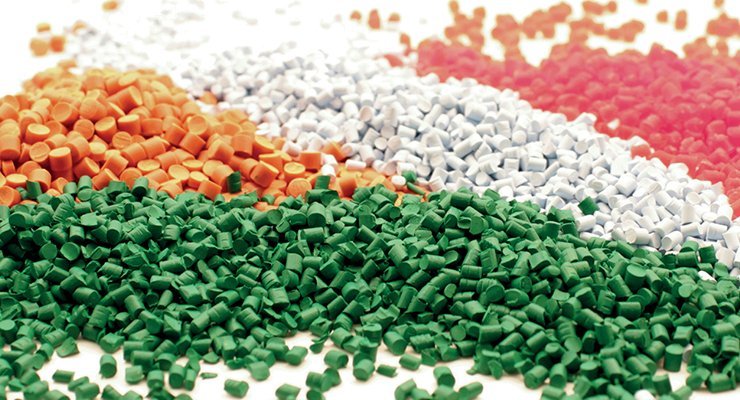
Biobased polymers
Aude Cordin, lecturer at UTC, is also a research scientist in the Enzymatic and Cellular Engineering (UTC-GEC) laboratory. Her research lies at the interface between bioresources, biomimetics and polymers.
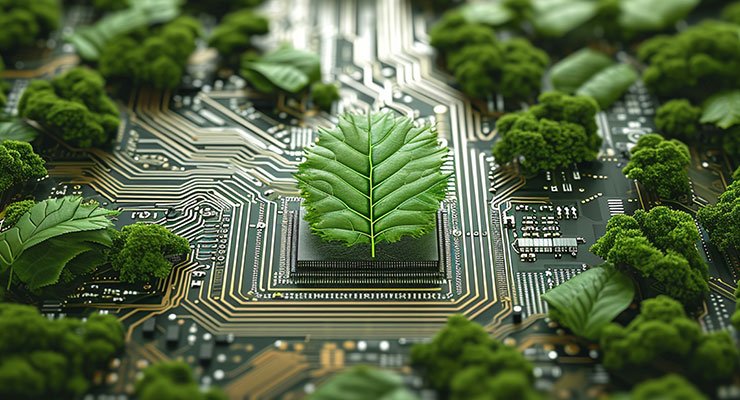
An industrial chair dedicated to eco-design
PTC, ECAM LaSalle and UTC have joined forces to create a new industrial chair: entitled “ProActive Design for Sustainability". The aim is that all design activities becomes eco-design by taking into account sustainable development issues and environmental impacts in an integrated way!

Industrial renewal through the development of the “Industry 5.0” concept
“Industry 5.0” embodies a paradigm shift in production systems, placing the emphasis on sustainability and social issues, as well as on collaboration between people and their technological eco-system (machines and software). It integrates advanced solutions such as AI (artificial intelligence), IoT (the Internet of Things) and robotics with human creativity and intuition to guarantee sustainable and ethical manufacturing. Unlike the previous paradigm, Industry 5.0 prioritises the well-being of company employees, fostering a more inclusive and equitable working environment. It aims to bring together the skills and capabilities of humans, machines and software to drive innovation, improve efficiency and address complex societal challenges, while ensuring an anthropo-centric approach to the adoption of technology that is controlled and just right.
Renewable Energies (RE)
UTC conducts research in the fields of clean energies, such as solar, wind and hydraulic energy. This work is desdigned to develop innovative solutions to reduce dependence on fossil fuels and promote energy sustainability.
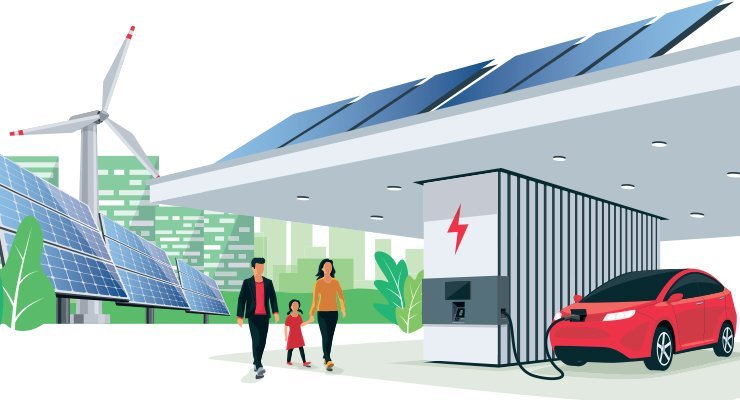
The UTC campus as a showcase for exemplary RE research: the STELLA platform and photovoltaic shades
The UTC Daniel Thomas Innovation Centre's car park is equipped with solar panel-covered shadings capable of intelligently recharging electric vehicles. This project is managed by the Avenues laboratory's STELLA (Smart Transport and Energy Living LAb) platform was supported by the ERDF and the Hauts-de-France Region. Using intelligent algorithms and power electronics, this system balances production and consumption flows. If no vehicles are being charged, or if there is a production surplus, the available energy is stored in batteries or used to power the adjacent building. The demonstrator can be used free of charge by UTC staff, who can thereby contribute their charging data to the research.
Sustainable mobility
UTC-Compiegne is working on research projects to improve transport systems by developing electric vehicles, traffic management technologies and intelligent transport infrastructures. These efforts help to reduce carbon emissions and promote more environmentally friendly modes of travel.
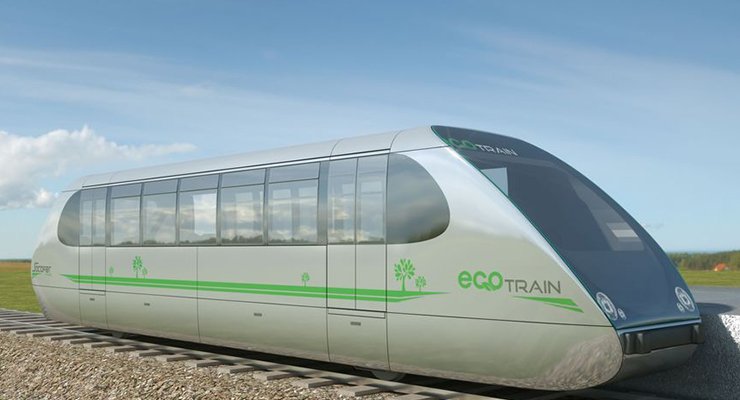
The ecotrain, the shuttle of the future
Walter Schön and Mohamed Sallak, both specialists in operational safety at UTC-Heudiasyc, joined the 'eco-train' project in 2022. Funded by the French Environment and Energy Management Agency (ADEME), the project involves 4 industrial partners and aims to revitalise secondary railway lines with small, autonomous, electrically-powered 16-metre-long shuttles designed to reduce their carbon footprint.
Managing natural resources
UTC research scientists are studying innovative methods for managing natural resources and reducing their consumption, such as water and recyclable materials. By developing sustainable technologies and practices, they help to preserve ecosystems and human health, as well as minimising environmental impacts.
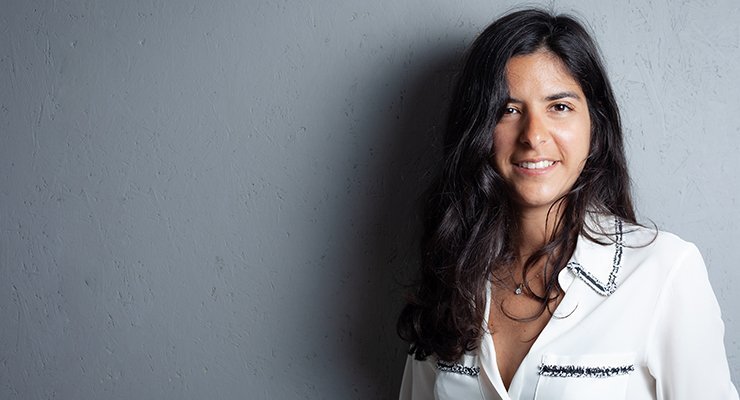
“Greening” dialysis protocols
More than 50,000 people suffering from kidney failure in France require haemodialysis or artificial kidney treatment. Nephrologist Hafsah Hachad has come to question the environmental impact of certain techniques, particularly dialysis, in terms of both carbon footprint and water consumption.
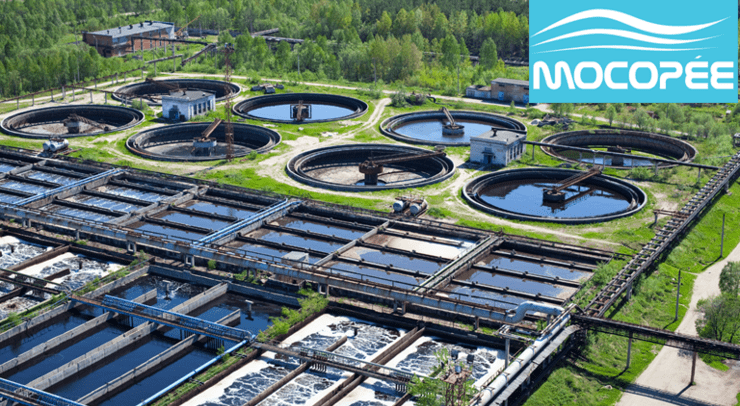
Mocopée 3, an "innEAUvation" project
Launched in 2014, Mocopée is a research programme involving more than twenty research teams and industrial partners, and has gone through two phases. The third phase, from 2023 to 2027, part of the InnEAUvation project, has just begun.
Preserving health and improving quality of life
UTC's research teams explore a wide range of fields, ranging from public health to medical biology and biomedical engineering. In collaboration with national and international partners, the research teams are constantly pushing back the frontiers of science to develop innovative solutions aimed at preventing and detecting diseases as early as possible, improving medical treatments and promoting general well-being.
Whether it be in designing new medical technologies, developing cutting-edge diagnostic tools or exploring the possibilities of regenerative medicine, UTC's research focus is guided by a common goal: to improve the health and comfort of individuals, while contributing to a healthier and more sustainable future for all.

Nutrition, one of the key elements for health
Mirian Kubo has been a lecturer-researcher at the UTC since 2021 and head of the IAA (Innovation, Food, Agroresources) course in Biological Engineering (GB) since 2023.

Revival Bionics, the prosthetics start-up of the future
Guillaume Baniel, 33, is the founder and CEO of Revival Bionics, which designs and manufactures an active walking assistance device, specifically a robotic human foot, for amputees. The aim of this device is to improve mobility and comfort for patients, so that every step becomes easy again.
Reducing pollution in all its forms
Solutions aimed at mitigating the harmful effects of all types of pollution, from chemical to noise, are being developed at the UTC. Through multidisciplinary approaches and a focus on innovation and societal impact, the research carried out at the UTC aims to develop effective and sustainable methods for preserving the quality of our environment and limiting the impact on our physical and mental health.
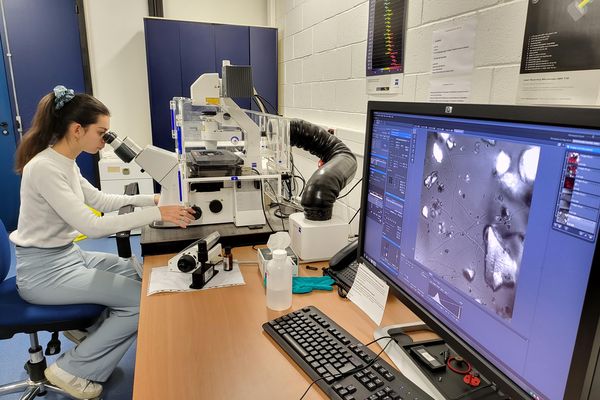
Using fungi to clean up the soil
At the UTC, a doctoral student is studying a fascinating creature: a fungus capable of cleaning up soil contaminated by hydrocarbons. Currently experimental, this technology is now being tamed so that it can be used in a few years' time.

In search of acoustic comfort
The transition in the propulsion mode of motor vehicles, from internal combustion to electric, is changing the sound experience for the user: the "purr" of the engine is disappearing, leaving more room for other sources of noise, such as equipment noises that were previously masked and therefore inaudible. Acoustic feedback on the operation of the vehicle is also modified: driving the vehicle "by ear" requires adaptation following the loss of certain reference points. Finally, new acoustic sources are appearing, such as those coming from the power electronics, the drive train or battery recharging. This transition can be accompanied by sounds whose purpose is to mask undesirable sources, such as whistling, to divert attention or to highlight information enabling better control of the vehicle, such as its speed. Work in this area is the subject of Matthieu Duroyon's doctoral thesis for the Renault group, in collaboration with IRCAM. It will help to improve comfort, contribute to vehicle ergonomics and safety, and also facilitate acceptance of a new mode of vehicle propulsion through the experience of sound.
Social innovation and inclusiveness
The UTC is also involved in initiatives to promote inclusion. This may include research projects on access to education, public health, or the development of technologies accessible to all.

Social Openness and Innovation Chair
Led by Michaël Vicente, senior lecturer in sociology at the Costech laboratory, this chair aims to examine the democratisation of engineering studies. Its work is based on three pillars: raising awareness of the engineering profession and innovation among young students from underprivileged backgrounds; personalised support for new students with less academic profiles by student tutors at the end of the course; and research into the role of social openness and diversity in the innovation process. This chair is supported by the patron, the Crédit Agricole Brie Picardie Foundation, as part of the UTC Foundation for Innovation, and by the Hauts-de-France Regional Council.
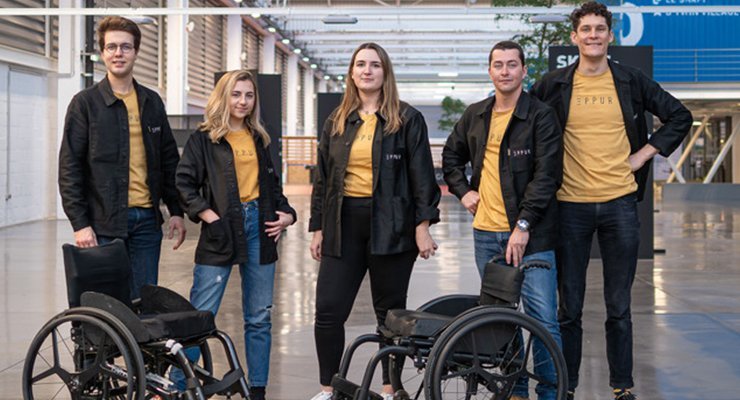
Eppur, a concentrate of technology made in UTC
Colin Gallois and Lancelot Durand founded Eppur, the first braking system for manual wheelchairs. The concept was born during Colin Gallois' UTCéennes years in the design department in 2015.
By combining these different fields of research and innovation, the UTC actively contributes to the ecological transition and to societal commitment by developing concrete and sustainable solutions to contemporary challenges.
Laboratories committed to assessing and controlling their environmental impact
The changes in research that are necessary in the face of the climate emergency also involve assessing the greenhouse gas (GHG) emissions of the UTC's laboratories. To date, five of the UTC's 8 laboratories – Biomechanics and Bioengineering (BMBI), Integrated Transformation of Renewable Materials (TIMR), Roberval, Avenues and Heudiasyc – have carried out their GHG emissions assessments over several years. This is a new management tool that will enable them to take concrete action to reduce their impact. The work is continuing for the other laboratories and at school level.
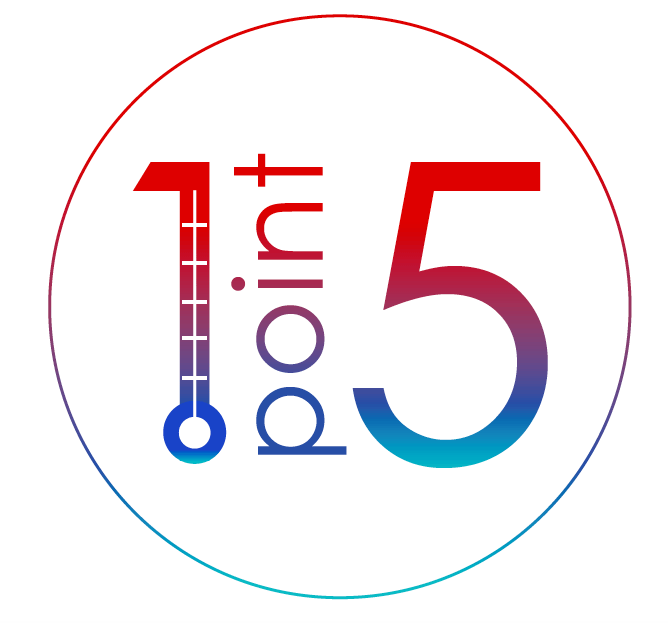
These laboratories are part of the movement initiated by the Labos 1point5 collective, which provides a measurement tool adapted to the scientific context and, more generally, aims to share knowledge and methods for reducing the environmental impact of research.
